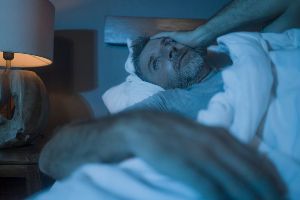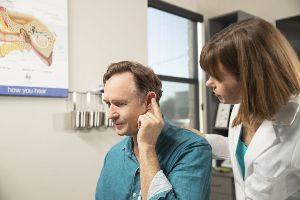|
www.HealthyHearing.com |
Does sleep hold the key to a tinnitus cure?Listening to white noise or music at bedtime linked to deeper sleep for people with tinnitus
Contributed by Temma Ehrenfeld Do you ever wake up during the night to phantom ringing, buzzing or other sounds only you can hear? This is known as tinnitus, and it's a common reason for sleep problems. Earlier this year, a team at the University of Oxford proposed why this happens, a perspective that they say could lead to better treatment for tinnitus, which researchers estimate affects as many as 1 out of 5 adults and in some cases is highly stressful. Tinnitus can wake you up, but why?
sleep. The Oxford team synthesized existing research to propose a new paradigm for tinnitus that interrupts sleep. First, a little background: When you fall asleep, your brain blocks out external stimuli to a great extent—which is how you can fall asleep with the TV on, for example. But how this happens is not well understood, the Oxford team points out, nor do we know much about how sleep changes responses to internal stimuli like tinnitus or pain. As you sleep, you cycle between four stages of brain function several times. The non-dreaming stages account for about three-quarters of your total sleep time. In those periods, the brain produces different types of wave activity that slowly spread back and forth across the brain. At first, that wave activity may suppress the brain signals that create ringing in the ears. But when the wave is less intense, tinnitus signals may surge, awakening you, the Oxford team proposed. “Sleep is ultimately linked to how tinnitus develops over time,” Linus Milinski and Victoria Bajo Lorenzana explained in an Oxford news release. “These findings will help researchers to identify a time window where delivering a treatment for tinnitus will be most effective before it develops into a permanent condition. The findings also may provide information about how tinnitus affects sleep quality. This could lead to a new line of research looking at whether sleep could help to correct the abnormal brain activity that is linked to tinnitus.” For more details, see an outline of the argument in this video and this article on sleep and tinnitus in The Conversation.
Tinnitus and sleep disturbancesScientists have long known that a range of sleep problems and chronic tinnitus often come together. To begin with, tinnitus sufferers seem to be lighter sleepers. Loud tinnitus roughly tripled the risk of insomnia in a Japanese survey regarding tinnitus, but even mild tinnitus could make it hard to fall asleep, stay asleep or feel rested. “Many of my patients report their tinnitus is very noticeable to them when they are trying to fall asleep as most people sleep in a quiet environment. When there is little to no other sound present, tinnitus becomes a focal point that is difficult, if not impossible, to ignore,” notes Katie Edmonds, an audiologist in the Bay Pines, Florida Veterans Affairs Health System. 
manage tinnitus. In addition, tinnitus, like hearing loss, has been linked to sleep apnea which usually causes snoring and is associated with daytime sleepiness, high blood pressure, stroke and other illnesses. Sleep problems tend to vary with age. As noted earlier, night terrors, which are most common in young boys, are linked to tinnitus in adults, specifically people ages 20 to 44, a study on night terrors found. In a night terror you wake up feeling terrified—you may also scream, sweat or have a rapid heart rate—yet have no memory of a bad dream. Living with both interrupted sleep and phantom sounds is a double whammy. As Edmond observes, sleep deprivation can “lead to other problems that contribute to difficulty coping with a chronic condition such as tinnitus.” Women with tinnitus and sleep issues are more likely than men to have headaches and neck pain or feel nervous or restless and men are more likely to report depression, according to 2021 tinnitus and insomnia research published in Germany. The good news is that although tinnitus has no cure, counseling and various kinds of sound therapies can cut its severity, which in turn can relieve sleep problems. Risk factors for tinnitusThe risk factors for tinnitus include damage to the ear from noise, hearing loss for other reasons, an ear infection or blockage in the ear canal, or a head or neck injury. It’s important to rule out Meniere’s disease—an inner ear disorder caused by abnormal fluid pressure—temporomandibular joint disorder, certain medications, an abnormal ear bone growth, or a Eustachian tube dysfunction. Drinking, smoking, obesity, diabetes, high blood pressure and heart problems also can increase your risk. What you can do to sleep betterYou might benefit from going to bed with restful music set to play for two hours. (Two hours is key — after that, white noise can be over-stimulating.) “Our study showed that this [is helpful],” said co-author Huseyin Deniz, an audiology and speech specialist at Gaziantep University in Turkey, who tested this music-based approach on 30 tinnitus patients. After six months, some patients said they no longer had tinnitus, and in others the sounds were quieter. Scores on a measure of depression also dropped. His goal, he told Healthy Hearing, was to help people “fall asleep with less exposure to the disturbing effects of tinnitus,” rather than prevent them from waking up. But the average length of the first non-REM sleep cycle is 70 to 100 minutes, so two hours would be likely to cover yours. It’s well worth a try! You might also consider these tips for tinnitus and better sleep. The views and opinions expressed in this article are those of the individuals interviewed and do not necessarily reflect the views or positions of the Department of Veterans Affairs or any entities they represent.
Related Help Pages:
Tests Tinnitus (ringing in the ears) Symptoms Causes Treatment Meniere's disease BPPV Dizziness
|
Featured clinics near me
Earzlink Hearing Care - Reynoldsburg
7668 Slate Ridge Blvd
Reynoldsburg, OH 43068

Find a clinic
Need a hearing test but not sure which clinic to choose?
Call 1-877-872-7165 for help setting up a hearing test appointment.

